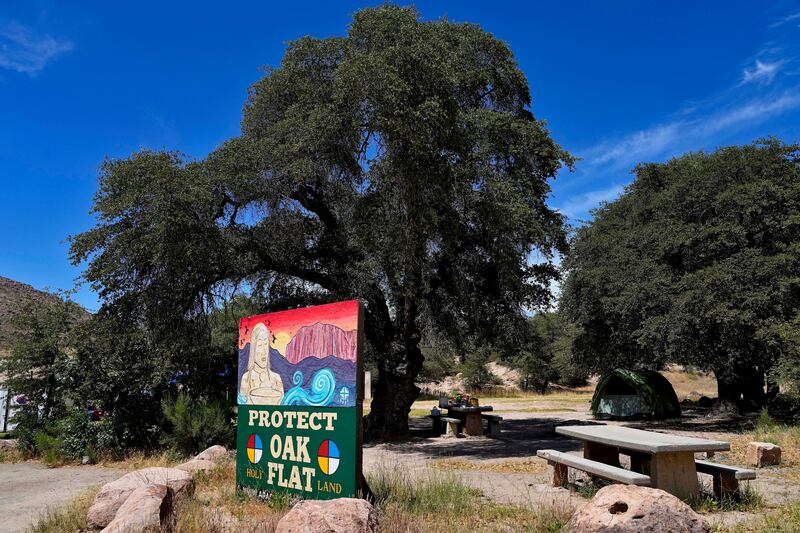A federal court is poised to decide whether a Native American sacred site will be destroyed by a massive copper mine. Mining proponents claim that destroying the sacred site is necessary for the development of green energy. That claim is both factually wrong and morally repugnant. And recent polling shows that the vast majority of Americans agree with what the constitution requires: Native sacred sites deserve the same protection as all other houses of worship.
Since before European contact, Western Apache and other Native tribes have lived and honored their Creator at Oak Flat, or “Chi’chil Bildagoteel.” The site is the birthplace of Western Apache religion and the site of ancient religious ceremonies that cannot take place anywhere else. Because of its religious and cultural significance, Oak Flat is on the National Register of Historic Places and has been protected from mining and other destructive practices for decades.
That changed in 2014, when several members of Congress, supported by corporate mining lobbyists, slipped an amendment into a must-pass defense bill authorizing the transfer of Oak Flat to a foreign-owned mining giant. That company, Resolution Copper, announced plans to obliterate the sacred ground by swallowing it in a mining crater nearly two miles wide and 1,100-feet deep, ending Apache religious practices forever. That was no surprise given the company’s sordid history dealing with Indigenous peoples. The majority owner of Resolution Copper is Rio Tinto (the world’s second largest mining company), which sparked international outrage in 2020 when it destroyed a 46,000-year-old rock shelter with some of the most significant aboriginal artifacts in all of Australia.
The Apache and their allies, represented by my firm, the Becket Fund for Religious Liberty, have been fighting in court to ensure that such an atrocity won’t repeat itself at Oak Flat. After initial court rulings against the Apache, a full panel of 11 judges at the Ninth Circuit Court of Appeals reheard their appeal last spring. A decision on whether the government can execute the land transfer is expected any day.
Resolution Copper and its backers want the public to believe that building the mine is essential for developing renewable energy. Extracting the copper beneath Oak Flat, they say, will help to build batteries necessary for powering electric vehicles and thus fight climate change. In other words, we have to destroy Oak Flat in order to save the planet.
These claims, however, are false — and they are specifically designed to obscure the physical and cultural destruction the project would wreak on the land.
The mine will destroy the environment, not save it. It is undisputed that the mine will swallow the ecologically diverse landscape of Oak Flat in a massive crater, decimating the local ecosystem. It will also leave behind approximately 1.37 billion tons of “tailings,” or mining waste, which, according to the government’s own environmental assessment, will pollute the groundwater and scar the landscape permanently. And the mine will consume vast quantities of water at the time it is most needed by drought-stricken towns and farmers.
Supporters of the mine are also at odds with the majority of Americans. According to this year’s Religious Freedom Index, an annual survey conducted by Becket, 74% of Americans believe that Native sacred sites on federal land should be protected from mining projects, even when the projects are purportedly pro-jobs and pro-environment.
That conclusion is both sensible and humane. America can transition to renewable energy without blasting the cradle of Western Apache religion into oblivion. And it should. For too long, our nation has made excuses for taking advantage of Indigenous people and their land. Indeed, our nation drove the Western Apache off Oak Flat and surrounding lands in the 1800s precisely to make way for mining interests. It shouldn’t repeat that injustice again.
It is past time to protect Indigenous sacred sites from further destruction. Basic fairness and our constitutional commitment to religious freedom require no less. And, happily, most Americans agree.
Luke Goodrich is vice president and senior counsel at the Becket Fund for Religious Liberty.

